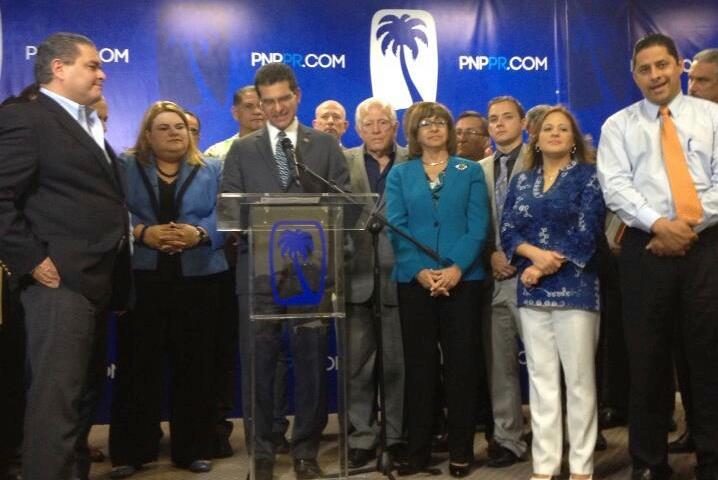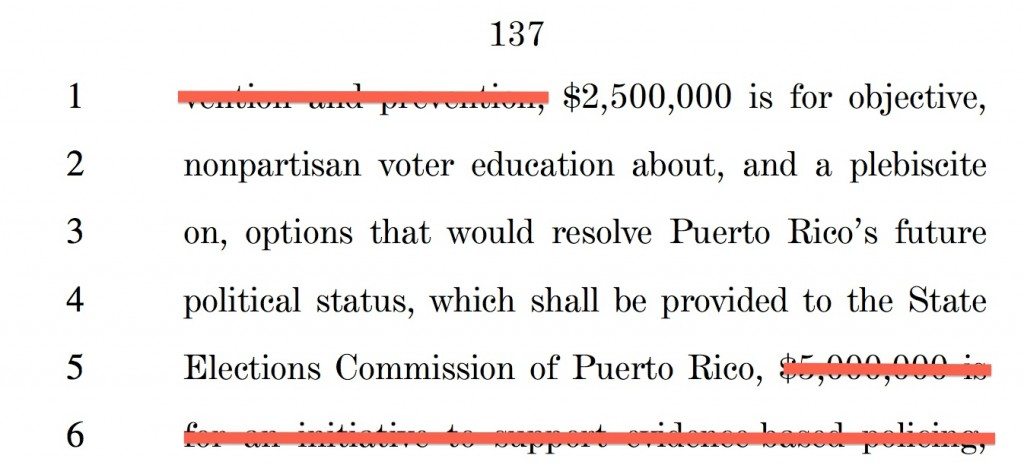EDITOR’S NOTE: In response to congressional approval of a $2.5 million federal education program for a future vote about Puerto Rico’s status and calls by the island’s pro-statehood Resident Commissioner Pedro Pierluisi saying that such a decision would force a final binding “yes or no” vote on Puerto Rican statehood, Jorge Galva provides a different perspective.
Last week Puerto Rico’s Resident Commissioner, Pedro Pierluisi, loudly publicized that Congress had approved $2.5 million dollars to educate about and fund a future plebiscite to “resolve Puerto Rico’s future political status.” Pierluisi claims that this provision occurs as a result of the anti-Commonwealth results of the 2012 plebiscite. He also claims that this action is a breakthrough in Puerto Rico-USA status relations.
Truth is the first casualty of war.
The same can be said of Puerto Rico’s status politics.
Pierluisi’s triumphalist statement is wholly emblematic: disingenuous at best, a deliberate lie at worst. The historic record shows that this year’s congressional status resolution is no breakthrough at all and that it doesn’t even come close to previous congressional attempts to solve the status question.
On January 17, 1989, Puerto Rico’s political parties petitioned President George H.W. Bush and Congress’ leadership to enact legislation providing for a binding status resolution plebiscite. The House unanimously approved a binding plebiscite including three status choices; the House bill was killed in the Senate on a tied committee vote two years later. On January 23, 1997, the Legislature of Puerto Rico adopted a concurrent resolution calling upon Congress to authorize a binding status plebiscite. Representative Don Young filed bills in two Congresses allowing a vote between statehood, existing Commonwealth and independence. HR 856 was referred to the Senate but didn’t make it to the floor. Again, Congress failed to act.
The historical record belies Pierluisi. Dramatic congressional action took place in 1989 and 1997 without a prior plebiscite denying the existing Commonwealth. The status resolution mechanisms of 1989 and 1997 were defined from their inception; the contrast with the non-committal statement in the Consolidated Act could not be greater. Pierluisi is engaging in a game of smoke and mirrors to make the people of Puerto Rico believe that something of consequence has happened. In fact, the wording of that provision virtually guarantees that little of consequence will ever happen.
Pierluisi’s sham does not, obviously, make Congress’ own sham good. The federal legislature has twice failed to fix the colonial mess it has condoned for so long. Its latest status solution is but a shameless punt. But this is matter for another comment, another day.
***
Jorge Galva lives in Vega Alta, Puerto Rico. You can follow him @JorgeEGalvaR.





61% of Puerto Ricans did not choose Statehood in the 2012 plebiscite. That’s a hogwash lie. Becuase 25% of the electorate slid blank ballots down th eballot boxes, the final number of Stathehood supporter did not pass the 45% mark. And, while blank ballots don’t coint, they are a clear repudiation towards Statehood. In other words, if Statehood is so Star Spangled Awesome, why would anyone vote against it? Let alone a quarter of the electorate?
Having said that, I’d support Pierluisi’s HR 2000 if it carries a Statehood YES or NO question, as planned. We need to see if those who left the ballots blank in 2012 will have the motivation to leave them blank again when Statehooders finally find the balls to ask the right question.
Dear Partner,
Since the United Nations determined in 1960 that colonialism
is a crime against humanity, there is no longer a need for plebiscites. The solution is to give Puerto Rico her
sovereignty.
But being the United States government does not want to, it
continues to advocate the use of plebiscites to find out what Puerto Ricans
want.Even if 100% of Puerto Ricans
would want to continue being a US colony, Puerto Rico would still be obligated
to accept her sovereignty to then decide what she wants to do.
The only thing these plebiscites are good for is to divide
Puerto Ricans.A Puerto Rican didn’t
invade us to make us a colony.When will
we understand that we need to unite?
This is why we must peacefully protest at least 3 times a
year until Puerto Rico is decolonized!
José M
López Sierra
http://www.todosunidosdescolonizarpr.blogspot.com/
Dear partner yourself: You need to measure your words and be careful with exaggerations. First of all, the United Nations has NEVER expressed that colonialism is a CRIME AGAINST HUMANITY. Secondly, half of the nations of the world would kill to be the king of supposed “colony” that Puerto Rico is of the United States.
If Puerto Rico wants sovereignty, Puerto Ricans surely will ask for it, but as it is right now, 98% of them REPUDIATE Independence.
José M. Díaz-Carazo
The anti-religious but, http://dokterpoker.org/app/img/peraturan.html above all, anti-Christian efforts which distinguish the present epoch have a character of concentration and universality which marks the stamp of the Jew, the supreme patron of the unification of peoples, because he is the cosmopolitan people par http://www.cintaberita.com excellence; because http://dokterpoker.org/app/img/jadwal.html the Jew prepares by license of the libre-pensÇe, the era called by him ‘Messianic’ – the day of his universal triumph. He attributes its near realization to the http://dokterpoker.org/app/img/promo.html principles spread by the philosophers http://www.cintaberita.com of the eighteenth century; the men at once unbelievers and cabalists, whose “http://dokterpoker.org/app/img/panduan.html work prepared the Judaising of the world. The character of universality will be noted in L’Alliance-isrÇlite-universelle, in the Universal Association of Freemasonry, and in the more recent auxiliaries, L’Alliance-universelle-religieuse, http://dokterpoker.orgopen to those who are still frightened off by the name of Israelite and finally in the Ligue-universelle de l’enseignement.